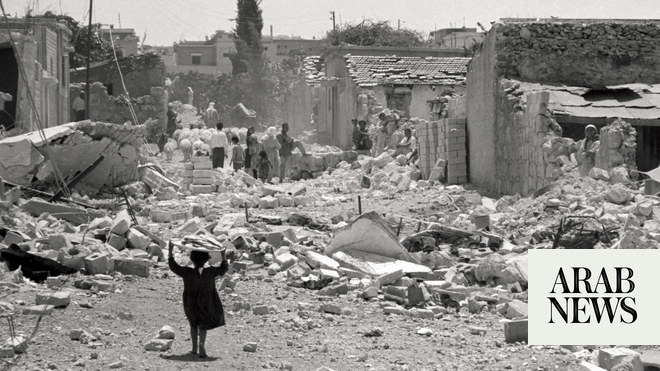
Prime Minister Benjamin Netanyahu’s admittance last week that Israel had carried out massive airstrikes against Iranian targets in Syria, including a weapons depot in Damascus airport, marked a major change in policy. For years, the Israeli Air Force had been carrying out attacks against suspected Iranian and Hezbollah positions in Syria without claiming responsibility.
The Jan. 20 strikes were triggered by the firing of a surface-to-surface missile from inside Syria toward the occupied Golan Heights, according to Israeli sources. It was met with unusual firepower from Israel, which launched tens of missiles from Lebanese airspace toward selected targets. Israel showed videos of a Syrian surface-to-air battery being destroyed, among other objectives. Syria said it had intercepted dozens of missiles — a claim that was corroborated by Moscow.
Following the Israeli attack, Netanyahu was quoted as saying that “whoever tries to hurt us, we will hurt them. Whoever threatens to destroy us will bear the full responsibility.” Going public was seen as a message to the Syrian regime, Iran and the Russians. Moscow had deployed the S-300 anti-aircraft missile system in Syria last October following a series of Israeli attacks.
But Netanyahu, who is fighting for his political survival ahead of crucial elections in April, may be risking more than he can handle. Last week, Russian Foreign Ministry spokeswoman Maria Zakharova said that “the practice of arbitrary strikes on the territory of a sovereign state, in this case we are talking about Syria, should be ruled out.” Israel had claimed in the past that it had reached an agreement with Moscow, under which it made clear that its strikes on Syria would not threaten the regime of President Bashar Assad. In return, the Russians said they would work to limit Iranian influence in the country. Behind-the-scenes negotiations succeeded in driving the Iranian Islamic Revolutionary Guard Corps (IRGC) and pro-Iran proxies back from Israel’s borders.
But Israel now believes that Hezbollah and fighters belonging to the Quds Force may be repositioning themselves close to the Golan Heights. The launching of a missile into Israeli-occupied territory could be seen as a game-changer.
Iran had responded to Israeli threats by saying it was ready for the fight. The Syrian representative at the UN also said that, if the international community does not intervene to stop Israeli strikes, then Syria has the right to bomb Tel Aviv airport. This latest escalation comes at a time when the US is finalizing plans to withdraw its troops from northeastern Syria, and when Moscow is calling on all uninvited foreign military personnel to pull out from that country.
Iranian hardliners see their presence in Iraq and Syria as a major asset in the fight against their enemies
Osama Al-Sharif
It is difficult to assess what kind of leverage, if any, the Assad regime has on Iranians present in Syria. Certainly, the regime is not looking for a fight with Israel, not now and not in the near future. But the complexity of the Syrian crisis over the past seven years has altered the geopolitical realities of the Eastern Mediterranean. Russia now has permanent military bases in Syria and, in many ways, it is responsible for its security and durability. The Iranians and their proxies believe that their intervention on behalf of the regime has tipped the balance of power in the region.
While Moscow has no interest in seeing an outbreak of open hostilities between Israel and Syria, its ability to control the Iranians is in doubt. Tehran is under pressure from the US and even the Europeans to change its behavior, but hardliners see their presence in Iraq and Syria as a major asset in the fight against their enemies.
For Israel, election fever aside, the Iranian presence in Syria, in addition to the present danger of Hezbollah, constitutes a major threat. There are reports that many of the Sunni fighters in the now-disbanded extremist groups in southern Syrian have joined Hezbollah’s ranks. The fact that Hezbollah is seeking to bolster its presence close to the Golan Heights cannot be disputed.
Appearing on a pro-Iran TV station on Saturday, Hezbollah leader Hassan Nasrallah warned Israel over its continued attacks in Syria, saying a miscalculation could drag the region into a war. Claiming that his group was in possession of precision missiles that could hit Tel Aviv, Nasrallah said they could cross into the Galilee, in northern Israel, “in reaction to an Israeli attack” in a future war. He warned that any war could be waged on more than one front, referring to Israel’s threats to Lebanon and Syria.
This brinkmanship by both sides has raised the chances of potential confrontation to their highest level since 2006, when Israel and Hezbollah fought a bloody war that tested both. Since then, the geopolitical conditions have changed drastically, with claims that Hezbollah’s missile arsenal could now pose a genuine threat to the heart of Israel. What is happening in Syria is a high-stakes face-off that could easily develop into a major conflagration. The reality is that no outside power has the ability to defuse a febrile situation and prevent a looming war.
Osama Al-Sharif is a journalist and political commentator based in Amman. Twitter: @plato010
Disclaimer: Views expressed by writers in this section are their own and do not necessarily reflect Arab News" point-of-view












